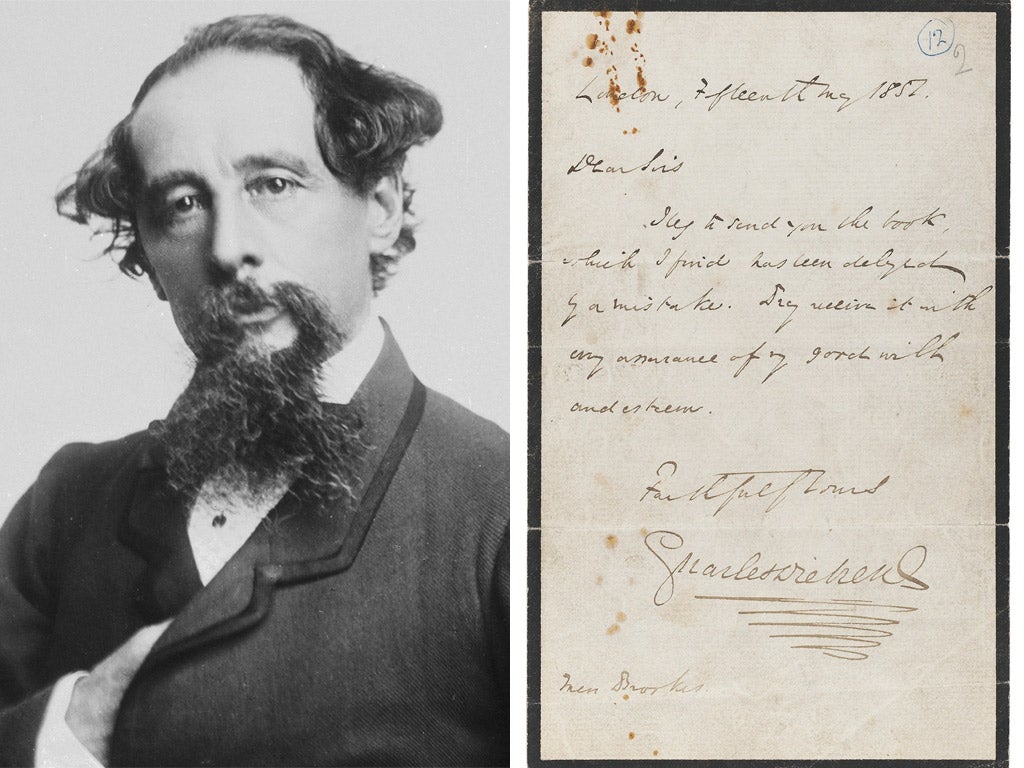The gift that led Dickens to give up his treasured copy of David Copperfield

Your support helps us to tell the story
From reproductive rights to climate change to Big Tech, The Independent is on the ground when the story is developing. Whether it's investigating the financials of Elon Musk's pro-Trump PAC or producing our latest documentary, 'The A Word', which shines a light on the American women fighting for reproductive rights, we know how important it is to parse out the facts from the messaging.
At such a critical moment in US history, we need reporters on the ground. Your donation allows us to keep sending journalists to speak to both sides of the story.
The Independent is trusted by Americans across the entire political spectrum. And unlike many other quality news outlets, we choose not to lock Americans out of our reporting and analysis with paywalls. We believe quality journalism should be available to everyone, paid for by those who can afford it.
Your support makes all the difference.The superstitious nature of Britain's greatest writer has come to light thanks to the sale of an inscribed first edition of Charles Dickens' favourite novel with its own intriguing backstory.
The auction of the author's personal copy of David Copperfield – his most autobiographical novel and his "favourite child" – has provided new insight into why Dickens gifted the book to a Sheffield tool manufacturer to dispel a curse.
It was first published in book form in 1850 to great acclaim, but when it was read by the owner of a Sheffield company named William Brookes and Sons, he was shocked to find its eponymous main character being ridiculed with an insulting nickname – "Brooks of Sheffield" – similar to his firm.
He contacted the author about the inadvertent slur and correspondence ensued, with Dickens telling the owner that the name was "one of those remarkable coincidences". He added: "I had no idea that I was taking a liberty with any existing firm, and why I added Sheffield to Brooks (of all the towns in England) I have no... knowledge. It came to my head as I wrote."
The factory owner subsequently presented him with a cutlery case in 1851. But the superstition that if a knife is received as a present the relationship of giver and recipient will be severed led Dickens to send his treasured edition in return. The volume is believed to have been with the Brookes family ever since.
While the letter from Dickens is in Yale University archives, scholars had no idea the actual volume, inscribed to "Brookes of Sheffield", had survived, or that it is accompanied by another autographed letter from Dickens apologising for its delay.
Dickens was so popular in his day that his books were published in great quantities, meaning an ordinary first edition today might be worth only £1,000. But the author's well-thumbed volume originally from his own shelves, inscribed and accompanied by a letter from Dickens, could be worth 50 times as much when it is auctioned at Christie's in London on 13 June.
David Copperfield was his most personal novel. Using material from his abandoned autobiography, it drew on his own life, including his father, the inspiration for Micawber, one of his greatest comic characters.
Whether a friendship ensued between the author and the industrialist is unknown, but the gift implies it. Dickens once wrote: "Like many fond parents, I have in my heart of hearts a favourite child. And his name is David Copperfield."
Join our commenting forum
Join thought-provoking conversations, follow other Independent readers and see their replies
Comments